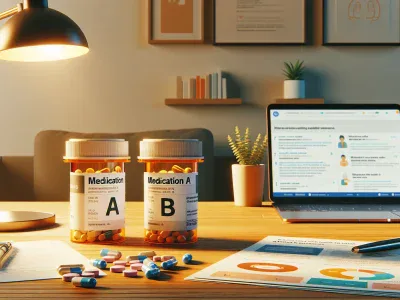Vyvanse Versus Adderall: Which ADHD Medication Is Right for You?
Imagine standing at the crossroads of focus and energy, where two powerful allies—Vyvanse and Adderall—await your decision. These medications, often prescribed for ADHD, offer unique paths to enhanced concentration and productivity. But which one aligns with your journey?
The battle between Vyvanse and Adderall is more than just a choice; it’s a quest for understanding their distinct rhythms. Vyvanse, with its smooth and steady release, whispers promises of sustained clarity, while Adderall, a potent mix of amphetamine salts, delivers a quick, intense burst of focus. As you navigate this labyrinth of options, knowing the nuances can make all the difference.
Dive deeper into their world to uncover the surprising benefits each holds. Whether it’s the gentle rise of Vyvanse or the immediate impact of Adderall, each offers a unique experience. Your decision could be the key to revealing your full potential.
Understanding Vyvanse and Adderall
Vyvanse and Adderall are common medications for managing ADHD, each with distinct properties. Knowing their differences helps in making informed choices.
What Is Vyvanse?
Vyvanse, a brand of lisdexamfetamine, serves as a prodrug. It metabolizes in the body into its active form, dextroamphetamine. This mechanism results in a gradual and prolonged effect, minimizing potential spikes and crashes. Vyvanse enhances focus and productivity, with effects lasting up to 14 hours. Always consult a healthcare professional before starting any medication.
What Is Adderall?
Adderall combines amphetamine and dextroamphetamine, offering a more immediate release. Its rapid absorption leads to quick concentration boosts but may cause peaks and troughs in energy levels. Typically effective for about 4-6 hours, it’s often prescribed in divided doses. Adderall, with its fast onset, works well for tasks requiring short bursts of intense focus. Speak with a medical provider to see if it suits your needs.
Efficacy in Treating ADHD
Vyvanse and Adderall both address symptoms of ADHD, yet their approaches differ. Understanding these differences aids in choosing the best option for managing the condition.
How Vyvanse Works
Vyvanse, known scientifically as lisdexamfetamine, is a prodrug. Your body metabolizes it into dextroamphetamine, leading to a gradual increase in effects. This slow release results in sustained attention over approximately 14 hours, reducing the peaks and troughs often experienced with stimulant medications. Vyvanse’s structure may minimize abuse potential because it requires metabolic conversion to become active (NIDA).
How Adderall Works
Adderall merges amphetamine and dextroamphetamine, providing a direct boost. It’s designed for quick absorption, making it effective within hours for rapid symptom control. Typically, the effects last 4-6 hours. This can necessitate multiple daily doses to maintain focus and attention throughout the day (FDA). Some individuals find Adderall’s prompt action beneficial, although it may cause fluctuations in energy levels and concentration.
Comparison of Side Effects
Vyvanse and Adderall, both used to manage ADHD symptoms, have distinct side effect profiles. Understanding these can inform your choice and improve your treatment experience.
Common Side Effects of Vyvanse
Vyvanse can cause several common side effects. These often include decreased appetite, dry mouth, and insomnia. More rarely, you might experience anxiety or irritability. Vyvanse’s gradual release might lessen severe peaks in these effects, according to MedlinePlus.
Common Side Effects of Adderall
Adderall shares some side effects with Vyvanse, but with variations. Decreased appetite, insomnia, and dry mouth are common. Users might also encounter increased heart rate and mood changes more frequently. Due to its shorter action, effects can fluctuate, as noted by NIMH.
Duration and Dosage Differences
When comparing Vyvanse and Adderall, understanding their duration and dosage differences is crucial for managing ADHD symptoms effectively.
Duration of Effectiveness
Vyvanse offers a longer duration of effect. Its effects can last up to 14 hours, providing a steady release that supports focus and productivity throughout the day. This extended effect reduces the need for multiple daily doses and helps maintain consistent energy levels.
In contrast, Adderall acts quickly but typically remains effective for only 4 to 6 hours. This shorter duration often requires additional doses to sustain its impact on concentration and energy. Many users may experience fluctuations in effectiveness due to this shorter active period.
Recommended Dosage Guidelines
Vyvanse’s starting dosage usually begins at 30 mg once daily in the morning, with potential increases in 10 to 20 mg increments, not exceeding 70 mg per day. Individual needs and responses dictate specific adjustments, under the supervision of a healthcare provider.
Adderall, but, is available in various formulations with flexible dosing. Immediate-release versions might be taken multiple times a day in smaller doses, while extended-release options offer a single daily dose. Initial dosages often start at 5 mg, with adjustments made based on therapeutic response, typically reaching 20 mg daily but not exceeding 40 mg.
Consulting with a healthcare professional ensures the prescribed dosage aligns with individual treatment goals and reduces the risk of adverse effects.
Cost and Availability
Understanding the cost and availability of Vyvanse and Adderall helps in deciding which medication might be more feasible for you.
Pricing Insights
Vyvanse tends to be more expensive than Adderall. On average, a 30-day supply of Vyvanse can range from $270 to $400 depending on the dosage strength. Adderall, but, often costs between $10 to $20 for generic versions, and $250 to $300 for brand-name forms in a 30-day supply. These differences might influence your choice if budget is a critical factor.
Insurance Coverage
Insurance often covers both medications, but the specifics vary widely by policy. Some plans might have a preference for the generic versions of Adderall due to their lower cost, potentially leading to better coverage compared to Vyvanse. Contacting your provider gives clarity on out-of-pocket expenses and prerequisites for coverage. Consider discussing these options with your healthcare provider to align with what is financially viable for your situation.
User Experiences and Reviews
Explore what users say about Vyvanse and Adderall. Their personal experiences often highlight surprising effects and outcomes beyond clinical expectations.
Personal Accounts of Vyvanse Use
Many users report sustained focus and energy when taking Vyvanse. For instance, one individual described being able to concentrate on tasks for hours without the typical afternoon slump. The smoother release often means users experience fewer crashes compared to other ADHD medications. If energy levels drop gradually, productivity remains stable throughout the day. But, some users notice initial side effects like decreased appetite, which might fade over time. This makes Vyvanse a popular choice for those seeking consistency in their daily routines.
Personal Accounts of Adderall Use
Adderall users often mention rapid energy boosts and heightened alertness. A college student shared how taking Adderall helped in cramming sessions before exams by increasing focus and study efficiency. But, the quick onset sometimes leads to noticeable peaks and troughs in energy levels. Those requiring steady concentration may find the short duration necessitates multiple doses. Users frequently report fluctuations in mood, especially if doses aren’t timed effectively. Even though these challenges, many appreciate Adderall’s potent effects for tasks needing immediate attention and focus.
Conclusion
Choosing between Vyvanse and Adderall eventually depends on your individual needs and lifestyle. Vyvanse’s smooth, long-lasting effects might suit those seeking consistent focus throughout the day, while Adderall’s rapid onset could benefit those needing quick boosts for specific tasks. Each medication has its unique side effect profile and cost considerations, which can influence your decision. Always discuss your options with a healthcare provider to ensure the treatment aligns with your personal and medical requirements. Your choice should empower you to manage ADHD effectively, enhancing your daily productivity and overall quality of life.
by Ellie B, Site owner & Publisher
- How To Tell Nits From Dandruff - February 19, 2026
- What Is Stronger: Adderall Or Ritalin - February 19, 2026
- Which Is More Nutritious: Chia Or Flax Seeds - February 18, 2026







